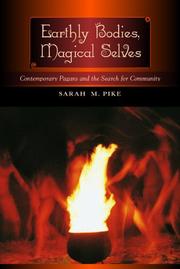| Listing 1 - 3 of 3 |
Sort by
|
Book
ISBN: 9780226327259 0226327256 1282069918 9786612069918 9780226327242 0226327248 Year: 2008 Publisher: Chicago University of Chicago Press
Abstract | Keywords | Export | Availability | Bookmark
 Loading...
Loading...Choose an application
- Reference Manager
- EndNote
- RefWorks (Direct export to RefWorks)
Augustine famously claimed that the virtues of pagan Rome were nothing more than splendid vices. This critique reinvented itself as a suspicion of acquired virtue as such, and true Christian virtue has, ever since, been set against a false, hypocritical virtue alleged merely to conceal pride. Putting On Virtue reveals how a distrust of learned and habituated virtue shaped both early modern Christian moral reflection and secular forms of ethical thought. Jennifer Herdt develops her claims through an argument of broad historical sweep, which brings together the Aristotelian tradition as taken up by Thomas Aquinas with the early modern thinkers who shaped modern liberalism. In chapters on Luther, Bunyan, the Jansenists, Mandeville, Hume, Rousseau, and Kant, she argues that efforts to make a radical distinction between true Christian virtue and its tainted imitations actually created an autonomous natural ethics separate from Christianity. This secular value system valorized pride and authenticity, while rendering graced human agency less meaningful. Ultimately, Putting On Virtue traces a path from suspicion of virtue to its secular inversion, from confession of dependence to assertion of independence.
Virtue. --- Imitation. --- Christian ethics. --- Ethics. --- Deontology --- Ethics, Primitive --- Ethology --- Moral philosophy --- Morality --- Morals --- Philosophy, Moral --- Science, Moral --- Philosophy --- Values --- Ethical theology --- Moral theology --- Theology, Ethical --- Theology, Moral --- Christian life --- Christian philosophy --- Religious ethics --- Mimicry --- Influence (Psychology) --- Social influence --- Conduct of life --- Ethics --- Human acts --- rome, roman, ancient, history, historical, italy, critique, analysis, critical, augustine, pagan, religion, faith, belief, vice, virtue, virtuous, taboo, early modern, christian, christianity, religious studies, secular, ethics, ethical, liberalism, luther, bunyan, jansenist, mandeville, hume, rousseau, philosophy, philosophical, kant.

ISBN: 9786612758799 1282758799 0520923804 1597345865 9780520923805 058539461X 9780585394619 0520220307 9780520220300 0520220862 9780520220867 6612758791 9781282758797 9781597345866 Year: 2001 Publisher: Berkeley, Calif. University of California Press
Abstract | Keywords | Export | Availability | Bookmark
 Loading...
Loading...Choose an application
- Reference Manager
- EndNote
- RefWorks (Direct export to RefWorks)
Recent decades have seen a revival of paganism, and every summer people gather across the United States to celebrate this increasingly popular religion. Sarah Pike's engrossing ethnography is the outcome of five years attending neo-pagan festivals, interviewing participants, and sometimes taking part in their ceremonies. Earthly Bodies, Magical Selves incorporates her personal experience and insightful scholarly work concerning ritual, sacred space, self-identity, and narrative. The result is a compelling portrait of this frequently misunderstood religious movement. Neo-paganism began emerging as a new religious movement in the late 1960's. In addition to bringing together followers for self-exploration and participation in group rituals, festivals might offer workshops on subjects such as astrology, tarot, mythology, herbal lore, and African drumming. But while they provide a sense of community for followers, Neo-Pagan festivals often provoke criticism from a variety of sources-among them conservative Christians, Native Americans, New Age spokespersons, and media representatives covering stories of rumored "Satanism" or "witchcraft. "Earthly Bodies, Magical Selves explores larger issues in the United States regarding the postmodern self, utopian communities, cultural improvisation, and contemporary spirituality. Pike's accessible writing style and her nonsensationalistic approach do much to demystify neo-paganism and its followers.
Neopaganism --- Festivals --- Neo-paganism --- Religions --- Rituals. --- United States --- Religion --- african american. --- ancient world. --- christianity. --- community. --- costume. --- cultural history. --- cultural studies. --- culture. --- erotic. --- eroticism. --- festivals. --- folklore. --- gender studies. --- magic. --- magical. --- myths. --- neopagan. --- pagan festivals. --- pagan gods. --- pagan history. --- pagan religion. --- paganism. --- pagans. --- religion. --- religious studies. --- satanism. --- social history. --- social studies. --- Paganism --- Neopagan festivals --- the United States --- popular religion --- ethnography --- pagan ceremonies --- ritual --- sacred space --- self-identity --- religious movements --- pre-Christian religious traditions --- pre-Christian cultural traditions --- Satanism --- witchcraft --- Neopagan communities --- Neopagan narrative --- gender --- eroticism
Book
ISBN: 9781138624702 Year: 2018 Publisher: Abingdon, Oxon Routledge
Abstract | Keywords | Export | Availability | Bookmark
 Loading...
Loading...Choose an application
- Reference Manager
- EndNote
- RefWorks (Direct export to RefWorks)
sociology --- NRMs --- norms --- spirituality --- faith --- alternative religion and young people --- new religious paradigms and European youth --- modernity --- Western Europe --- theory of materialism --- theory of postmaterialism --- New Age --- enchantment and magic --- esoteric practices --- consequences of new esotericism --- image of God --- prayer --- new religious movements and youth culture in Great Britain --- ecstasy --- salvation --- the techno youth scene --- symbolic structural differentiation --- new religious phenomena in Eastern Europe --- neo-pagan religion --- symbolic practices --- validating symbolized identity --- church religiosity --- alternative religiosity --- family problems --- blind alley situations --- conflict of values --- the generation gap --- Iceland --- Nyall --- Asatru
| Listing 1 - 3 of 3 |
Sort by
|

 Search
Search Feedback
Feedback About UniCat
About UniCat  Help
Help News
News